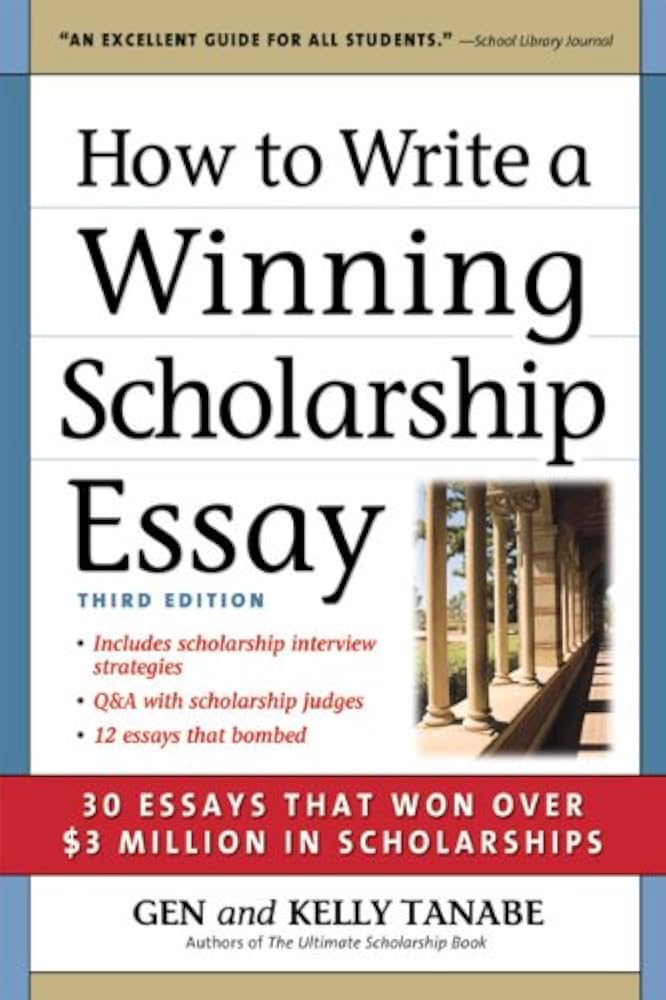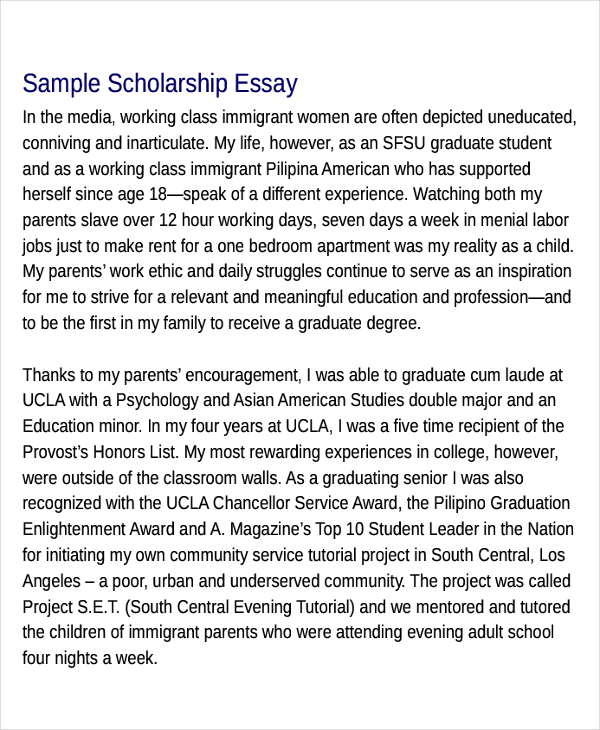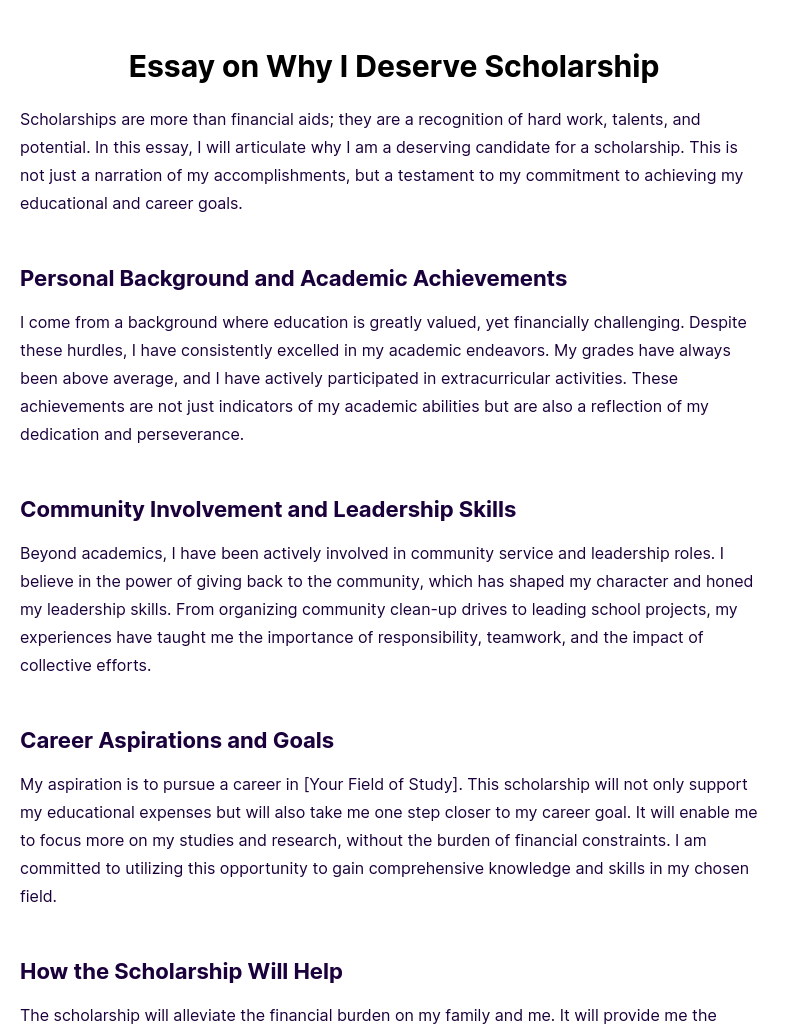How to Write a Winning Scholarship Essay

Securing a scholarship can significantly ease the financial burden of education, but it's a competitive process. A standout scholarship essay is often the key to unlocking these opportunities. It's your chance to showcase your personality, skills, and aspirations beyond academic transcripts. Mastering the art of essay writing can set you apart from other applicants. This guide provides actionable tips and strategies to craft a compelling essay that resonates with the selection committee. Learn how to structure your narrative, highlight your unique qualities, and ultimately, write a winning scholarship essay.
Crafting a Compelling Scholarship Essay
Writing a winning scholarship essay requires a strategic approach, combining a clear understanding of the prompt, a compelling narrative, and meticulous execution. It's not just about showcasing your achievements; it's about demonstrating who you are as a person, what motivates you, and how you plan to contribute to the world. The key is to connect your personal story to the values and mission of the scholarship provider, making a strong case for why you deserve their investment. Remember to proofread carefully and seek feedback to ensure your essay is polished and impactful.
Understanding the Scholarship Provider
Before you even begin writing, thoroughly research the organization or institution offering the scholarship. Understand their mission, values, and priorities. What are they looking for in a recipient? Tailor your essay to align with these aspects, highlighting experiences and qualities that demonstrate your suitability for their specific scholarship. This shows you're not just looking for money; you're genuinely interested in what they stand for.
Brainstorming and Outlining Your Essay
Effective brainstorming is crucial. Begin by listing your achievements, experiences, and personal qualities that are relevant to the scholarship criteria. Then, identify the stories behind these achievements – the challenges you overcame, the lessons you learned, and the impact you made. Create an outline to structure your essay logically, ensuring a clear introduction, body paragraphs with strong evidence, and a compelling conclusion. This will help you stay focused and avoid rambling.
Crafting a Captivating Introduction
Your introduction is your first and often only chance to make a strong impression. Start with a hook that grabs the reader's attention – a compelling anecdote, a thought-provoking question, or a bold statement. Clearly state your purpose for writing the essay and briefly outline the main points you will cover. Avoid generic phrases and clichés; be authentic and genuine in your tone. A well-crafted introduction sets the stage for the rest of your essay.
Developing Strong Body Paragraphs
Each body paragraph should focus on a single, well-defined idea that supports your overall argument. Provide specific examples and evidence to back up your claims, using vivid language and concrete details to bring your stories to life. Avoid vague generalizations and unsupported assertions. Show, don't tell, by illustrating your skills and experiences through compelling narratives. Ensure each paragraph transitions smoothly to the next, creating a cohesive and engaging flow.
Writing a Memorable
Your conclusion should leave a lasting impression on the reader. Reiterate your key points in a concise and impactful way, emphasizing how you align with the scholarship provider's values and mission. End with a strong call to action, expressing your gratitude for the opportunity and reaffirming your commitment to your goals. Avoid introducing new information or simply summarizing what you've already said. Aim for a conclusion that is both memorable and inspiring.
| Category | Winning Essay Traits | Common Mistakes to Avoid |
|---|---|---|
| Content | Authentic voice, specific examples, clear connection to scholarship goals | Generic statements, irrelevant information, lack of focus |
| Structure | Logical flow, well-defined paragraphs, strong introduction and conclusion | Rambling sentences, disorganized ideas, weak transitions |
| Style | Vivid language, engaging narrative, professional tone | Clichés, jargon, overly formal or informal language |
| Grammar & Mechanics | Error-free writing, proper grammar and punctuation, clear and concise sentences | Typos, grammatical errors, awkward phrasing |
| Impact | Memorable and inspiring, demonstrates passion and potential, resonates with the reader | Bland and uninspired, fails to connect with the reader, lacks a clear message |
How to write an essay to win a scholarship?

Understand the Scholarship and Its Requirements
Before you begin writing, it's crucial to understand the specific criteria and values that the scholarship committee is looking for. Thorough research will allow you to tailor your essay effectively.
- Carefully read the scholarship guidelines and application instructions. Note any specific themes, questions, or prompts that you need to address.
- Research the organization or individual offering the scholarship. Understanding their mission and values will help you align your essay with their goals.
- Identify the key attributes or qualities they are seeking in a recipient. These may include leadership, academic excellence, community involvement, or financial need.
Craft a Compelling Narrative
A scholarship essay is your opportunity to tell your story and connect with the reader on a personal level. Don't just list your accomplishments; weave them into a narrative that showcases your unique experiences and perspectives.
- Start with a captivating hook. This could be an anecdote, a thought-provoking question, or a surprising statement that grabs the reader's attention.
- Focus on a central theme or message. This could be a challenge you overcame, a passion you pursue, or a goal you are working towards.
- Use vivid language and sensory details to bring your story to life. Show, don't tell, by describing your experiences in a way that engages the reader's emotions and imagination.
Highlight Your Achievements and Skills
Your essay should demonstrate your accomplishments and skills in a way that is both informative and engaging. Provide specific examples and quantify your achievements whenever possible.
- Focus on the accomplishments that are most relevant to the scholarship. Highlight your academic achievements, extracurricular activities, volunteer work, and leadership roles.
- Quantify your achievements whenever possible. Use numbers and statistics to demonstrate the impact of your work.
- Connect your achievements to your future goals. Explain how the scholarship will help you achieve your aspirations and make a positive contribution to society.
Show, Don't Tell: Use Specific Examples
Instead of simply stating your qualities, provide specific examples that illustrate them. This will make your essay more credible and engaging.
- Avoid making generic statements like "I am a hard worker." Instead, describe a specific situation where you demonstrated your work ethic.
- Use the STAR method (Situation, Task, Action, Result) to structure your examples. This will help you provide a clear and concise account of your experiences.
- Reflect on what you learned from your experiences. Explain how your challenges and successes have shaped you into the person you are today.
Proofread and Edit Carefully
A polished and error-free essay will make a positive impression on the scholarship committee. Take the time to proofread and edit your essay carefully before submitting it.
- Proofread your essay multiple times, paying attention to grammar, spelling, punctuation, and sentence structure. It's often helpful to read your essay aloud to catch errors that you might miss when reading silently.
- Ask a friend, teacher, or family member to review your essay. A fresh pair of eyes can often spot errors that you have overlooked.
- Use a grammar and spell checker to identify potential errors. However, don't rely solely on these tools, as they may not catch all errors.
What is the best first sentence for a scholarship essay?

Avoid Clichés and Generalizations
One of the biggest pitfalls in scholarship essays is starting with a cliché. Statements like "Since I was a child, I've always wanted to..." or "I am a hardworking student with a passion for..." are overused and don't make you stand out. Instead, focus on being original and authentic. Get rid of fillers that don't add unique value.
- Identify common clichés related to your field or background.
- Brainstorm alternative ways to express those ideas that are unique to your experience.
- Ask a trusted friend or teacher to review your opening line and identify any clichés you might have missed.
Focus on Authenticity and Voice
Scholarship committees want to get to know you as an individual, so your first sentence should reflect your genuine voice. Don't try to be someone you're not or use language that doesn't feel natural to you. Authenticity builds trust and makes your essay more engaging. If you write well, they will be convinced that you are worth being awarded the scholarship.
- Write as if you are talking to a friend or mentor.
- Use language that is comfortable and familiar to you.
- Read your essay aloud to ensure it sounds natural and authentic.
Connect to the Scholarship's Goals
Consider the mission and values of the organization offering the scholarship. Your opening sentence should subtly hint at how your goals and aspirations align with theirs. This demonstrates that you've done your research and are genuinely interested in what they stand for. Explicitly showing you know what the scholarship is about is key. Don't focus on yourself only.
- Research the scholarship provider and their mission.
- Identify key themes or values that resonate with you.
- Weave those themes into your opening sentence and essay.
Use a Compelling Anecdote
A well-chosen anecdote can immediately draw the reader into your story and make your essay more memorable. Start with a brief, vivid description of a significant event or experience that shaped you. The key is to make it relevant to the scholarship and your overall narrative. The anecdote sets the tone for the entire essay.
- Identify a defining moment or experience in your life.
- Craft a short, engaging description of that event.
- Connect the anecdote to your goals and aspirations.
Create Intrigue and Curiosity
Your opening sentence should make the reader want to learn more about you. This could involve posing a question, making a surprising statement, or hinting at a challenge you overcame. The goal is to hook their attention and keep them reading. Don't give away everything at once.
- Brainstorm thought-provoking questions related to your field or experience.
- Think about unexpected or surprising aspects of your story.
- Use your opening sentence to create a sense of mystery or anticipation.
How to write a good why I deserve this scholarship essay?

Crafting a Compelling Narrative
The "Why I Deserve This Scholarship" essay isn't just a list of accomplishments; it's a story. It's about weaving together your experiences, aspirations, and financial needs into a coherent and compelling narrative that resonates with the scholarship committee. The goal is to make the reader understand who you are as a person, not just as a student. A powerful narrative will make your essay memorable and differentiate you from other applicants.
- Begin with a captivating hook: An anecdote, quote, or strong statement that grabs the reader's attention immediately.
- Develop a clear storyline: Structure your essay with a beginning, middle, and end that seamlessly connect your experiences, goals, and financial need.
- Use vivid language and imagery: Bring your story to life with descriptive language that helps the reader visualize your experiences and understand your perspective.
Demonstrating Academic Excellence and Potential
Scholarship committees are looking for students who have demonstrated academic excellence and have the potential to succeed in their chosen field. It's not enough to simply state your GPA or list your courses; you need to showcase your academic achievements in a way that demonstrates your passion for learning and your commitment to excellence. Quantify your achievements whenever possible to provide concrete evidence of your academic abilities.
- Highlight your academic achievements: Focus on your GPA, standardized test scores, awards, and any other academic honors you have received.
- Showcase your passion for learning: Explain what motivates you to learn and how you approach your studies.
- Demonstrate your potential for future success: Discuss your academic goals and how you plan to achieve them.
Highlighting Extracurricular Involvement and Leadership Skills
Extracurricular activities and leadership roles demonstrate your well-roundedness, teamwork skills, and commitment to making a difference. Scholarship committees are looking for students who are actively involved in their communities and who have demonstrated the ability to lead and inspire others. Focus on the activities that are most relevant to your scholarship and that demonstrate your passion and commitment.
- Describe your involvement in extracurricular activities: Explain your role in each activity and the impact you made.
- Showcase your leadership skills: Highlight any leadership positions you have held and the challenges you overcame.
- Connect your extracurricular activities to your goals: Explain how your extracurricular activities have helped you develop skills and knowledge that will be valuable in your future career.
Articulating Your Financial Need Clearly and Honestly
Addressing your financial need is a crucial part of your scholarship essay. Be transparent and honest about your financial situation, but avoid being overly dramatic or focusing solely on your hardships. Instead, emphasize how the scholarship will empower you to focus on your studies and achieve your goals without being burdened by financial stress.
- Explain your financial situation: Describe your family's income, expenses, and any other factors that contribute to your financial need.
- Quantify your financial need: Explain how much money you need to cover your tuition, fees, and living expenses.
- Explain how the scholarship will help you: Describe how the scholarship will alleviate your financial burden and allow you to focus on your studies.
Proofreading and Polishing Your Essay
A well-written and error-free essay demonstrates your attention to detail and professionalism. Proofreading and polishing your essay is essential to ensure that it is clear, concise, and free of grammatical errors, spelling mistakes, and typos. Consider asking a trusted friend, teacher, or mentor to review your essay before you submit it.
- Read your essay aloud: This will help you identify any awkward phrasing or grammatical errors.
- Use a grammar checker: A grammar checker can help you identify and correct any errors in your writing.
- Ask someone else to proofread your essay: A fresh pair of eyes can often catch errors that you have missed.
Frequently asked questions
What makes a scholarship essay stand out from the crowd?
A winning scholarship essay needs to demonstrate your uniqueness and passion. Instead of simply stating your achievements, illustrate them with compelling stories and vivid details. Focus on showing, not just telling, the impact you've made and the lessons you've learned. A genuine voice and a clear understanding of the scholarship's mission will set you apart.
How important is it to address the scholarship's specific prompt or theme?
It's crucial. Scholarship committees want to see that you've carefully read and understood the prompt. Your essay should directly answer the question or address the theme in a thoughtful and relevant way. Straying from the topic can signal a lack of attention to detail or a lack of genuine interest in the scholarship.
What kind of tone and language should I use in my essay?
Your essay should strike a balance between being professional and personal. Use clear, concise, and grammatically correct language, but also allow your personality to shine through. Avoid slang or overly informal language. Strive for a tone that is both confident and humble, showcasing your strengths while acknowledging your growth.
How can I ensure my essay is polished and error-free?
Proofreading is essential. After writing your essay, set it aside for a day or two and then review it with a fresh pair of eyes. Ask trusted friends, family members, or teachers to read your essay and provide constructive feedback. Pay close attention to grammar, spelling, and punctuation. Even minor errors can detract from the overall impact of your essay.
